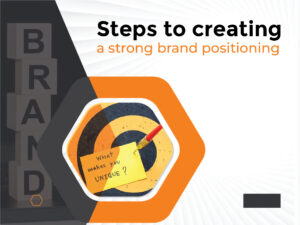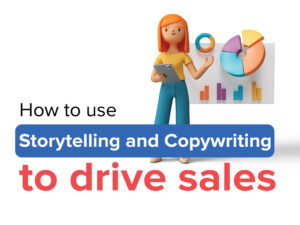Table of contents
- The Benefits of Using Unique Lead Generation Strategies for Nigerian Businesses
- 8 B2B Lead Generation Strategies Specific to Nigerian Market
- 8 B2C Lead Generation Strategies Specific to Nigerian Market
- B2B vs B2C Marketing: Growing Sales in Nigeria
- How to Measure the Success of Unique Lead Generation Strategies in Nigerian Markets.
- Conclusion
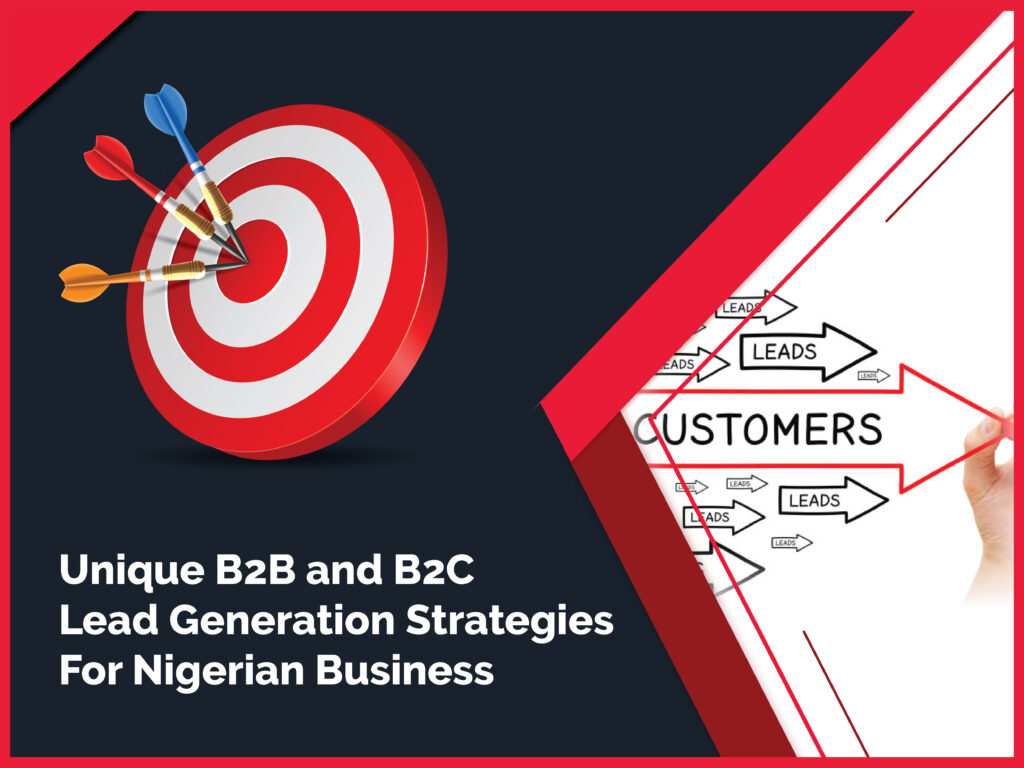
In today’s highly competitive Nigerian business landscape, generating quality leads is a constant challenge for both B2B and B2C companies. The key to success lies in implementing unique and effective strategies that can cut through the noise and capture the attention of potential customers. In this comprehensive guide, we will explore a range of innovative/ unique lead generation strategies specifically tailored for Nigerian businesses. By leveraging these strategies, you can significantly enhance your lead generation efforts and drive sustainable growth.
The Benefits of Using Unique Lead Generation Strategies for Nigerian Businesses
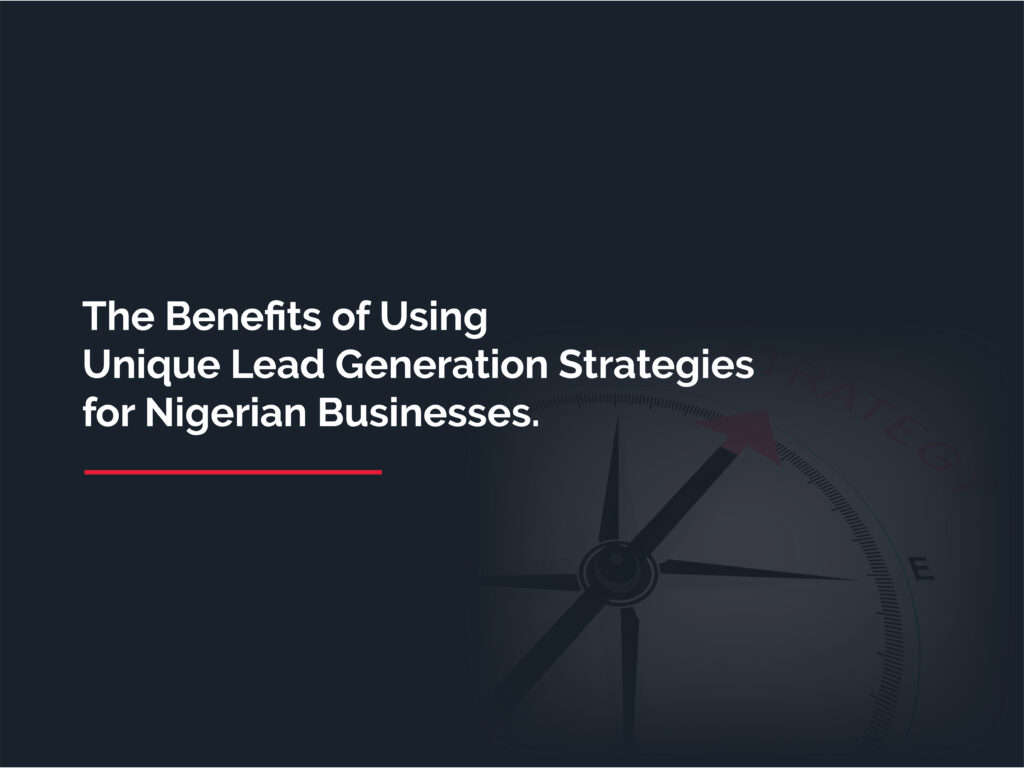
Using unique lead generation strategies for Nigerian businesses comes with several benefits that can help businesses stand out from their competitors and attract more customers. Some of these benefits include:
- Increased brand awareness: Using unique lead generation strategies can help businesses create more awareness about their brand, making it easier for potential customers to remember them. When a business stands out from competitors, it will be easier for customers to recognize and remember the brand, even when they are ready to make a purchase.
- Higher conversion rate: Unique lead generation strategies have been found to improve the conversion rate of businesses. When businesses use new and innovative strategies, they can get the attention of potential customers who are more likely to be interested in the product or service offered by the business.
- Lower cost per acquisition: Unique lead generation strategies can also help businesses reduce the cost per acquisition. Since these strategies are not commonly used by competitors, they can be cheaper and more efficient, leading to a lower cost per acquisition metric.
- Brand differentiation: Unique lead generation strategies help businesses stand out from their competition. This differentiation can lead to improved brand recognition and customer loyalty, making it easier for businesses to retain customers over time.
8 B2B Lead Generation Strategies Specific to Nigerian Market
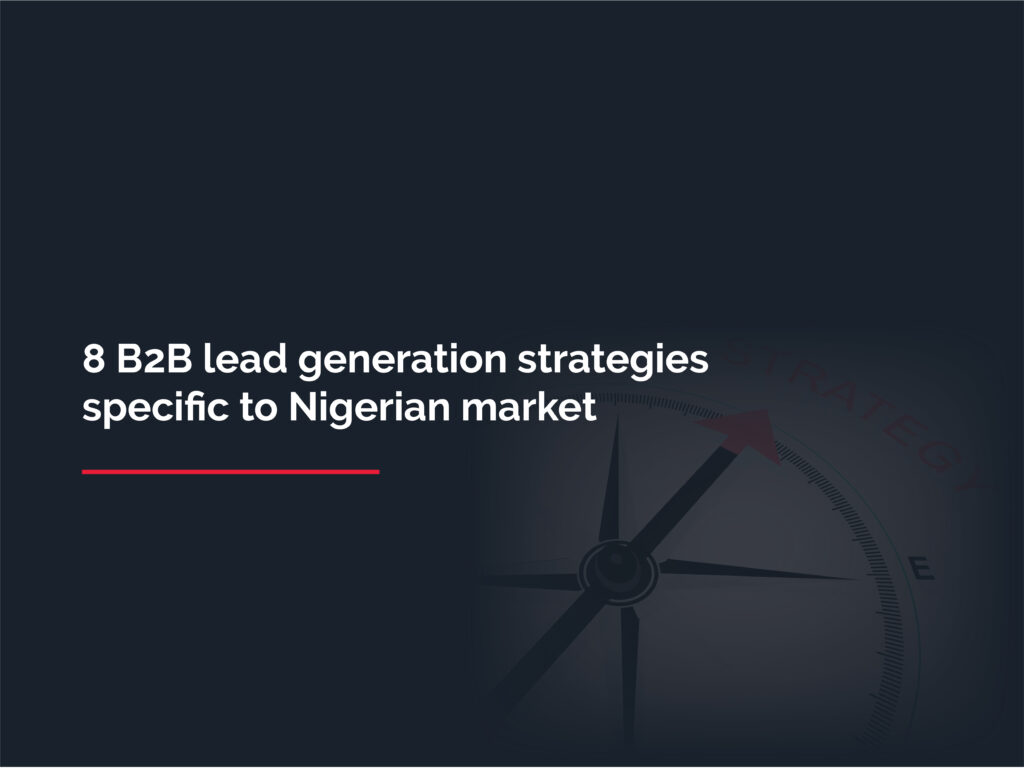
Business-to-business (B2B) lead generation uses different tactics than business-to-consumer (B2C) lead generation because the target audience is different. Here are unique B2B lead generation strategies for Nigerian businesses:
- Attend Networking Events: Participate in trade fairs and industry conferences to connect with potential partners and clients. Exchange business cards and engage in meaningful conversations. This will help you establish relationships and build trust, which can lead to long-term partnerships. As an example, businesses in the technology industry can attend events such as NigeriaCom, an annual technology conference that attracts industry experts, thought leaders, and stakeholders. Attending similar events in other sectors provides unique opportunities to connect with potential clients.
- Leverage LinkedIn: LinkedIn is a powerful social media platform for B2B lead generation. It is the largest professional networking site globally, with over 700 million members worldwide and 2 million in Nigeria. Companies can utilize LinkedIn to showcase their expertise through thought leadership content, engage their target audience through groups, and generate leads by posting job openings. Another powerful tool is LinkedIn Sales Navigator, which allows businesses to identify potential leads based on job titles, industry, company size, and location.
- Offer Free Consultations: Offering potential clients a free trial or consultation provides an opportunity to showcase the value of a product or service. It helps to build trust and establish a relationship with potential clients. After the trial or consultation, businesses can engage with the leads and provide additional value, such as case studies, testimonials, or demos.
- Use social media: Social media is a great tool for B2B lead generation. LinkedIn, in particular, is an excellent platform for networking and connecting with potential customers and partners. You can also use Twitter and Facebook to share content and engage with your audience.
- Build a referral program: Word of mouth is still one of the most powerful marketing tools, and referral programs are a great way to leverage this. Encourage your existing customers to refer you to their network and offer incentives for successful referrals.
- Partner with complementary businesses: Partnering with businesses that offer complementary products or services can be a great way to generate leads. For example, if you’re in the software development industry, you could partner with a company that offers hardware solutions.
- Use targeted advertising: Targeted advertising on platforms like Google and Facebook can help you reach your ideal customer. You can target people based on their interests, job titles, and even the companies they work for.
- Build an email list: Email marketing is still an effective way to generate leads. Building an email list of potential customers and partners and sending them regular newsletters or updates can help to keep your brand top of mind.
8 B2C Lead Generation Strategies Specific to Nigerian Market
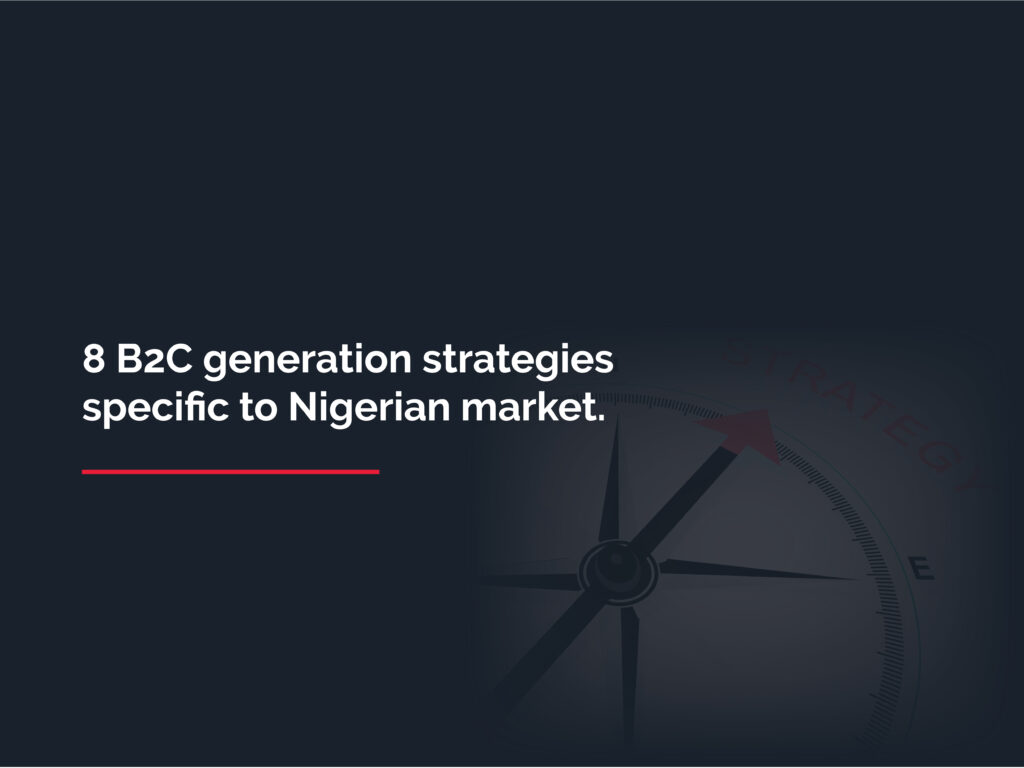
Business-to-consumer (B2C) lead generation requires a different approach than B2B lead generation. Here are unique B2C lead generation strategies for Nigerian businesses:
- Leverage Local SEO: Local SEO is an effective B2C lead generation strategy for Nigerian businesses. It involves optimizing a website’s content and structure to rank higher on search engines for local searches. Nigerian businesses can utilize local SEO by optimizing their website’s meta tags, creating location-specific content, and listing their business on local directories such as Google My Business and Yelp. Nigerian businesses can use these directories to provide accurate and updated information about their business, including address, phone number, and business hours.
- Utilize social media Influencer Marketing: Social media influencer marketing has become a popular way for B2C businesses to generate leads. Influencers are individuals with a significant following on social media platforms such as Instagram, Twitter, and Facebook. Nigerian businesses can collaborate with social media influencers to promote their products or services to their followers. Influencers can create engaging content, showcase products, and drive sales. It is important to choose influencers whose audience aligns with the target audience of the business.
- Leverage SMS Marketing: SMS marketing is a cost-effective and direct way to engage with potential customers. It involves sending text messages to individuals who have consented to receive them. Nigerian businesses can utilize SMS marketing to promote products, provide personalized offers and discounts and drive traffic to their website. It is important to segment the audience and personalize the messages to increase engagement.
- Run promotions and contests: Nigerians love a good bargain, so running promotions and contests can be an effective way to generate B2C leads. Offer discounts or run contests on social media to encourage people to engage with your brand and sign up for your mailing list.
- Use targeted advertising: Targeted advertising on platforms like Google and Facebook can help you reach your ideal customer. You can target people based on their demographics, interests, and online behavior.
- Use email marketing: Email marketing is an effective way to engage with potential customers. Build an email list and send regular newsletters or updates to keep your brand top of mind.
- Partner with other businesses: Partnering with other businesses that offer complementary products or services can help to generate B2C leads. For example, if you’re a clothing retailer, you could partner with a makeup brand to offer a joint promotion.
- Attend events and exhibitions: Attending events and exhibitions where your target audience is likely to be can be a great way to generate B2C leads. Set up a booth and showcase your products or services to attract potential customers.
B2B vs B2C Marketing: Growing Sales in Nigeria
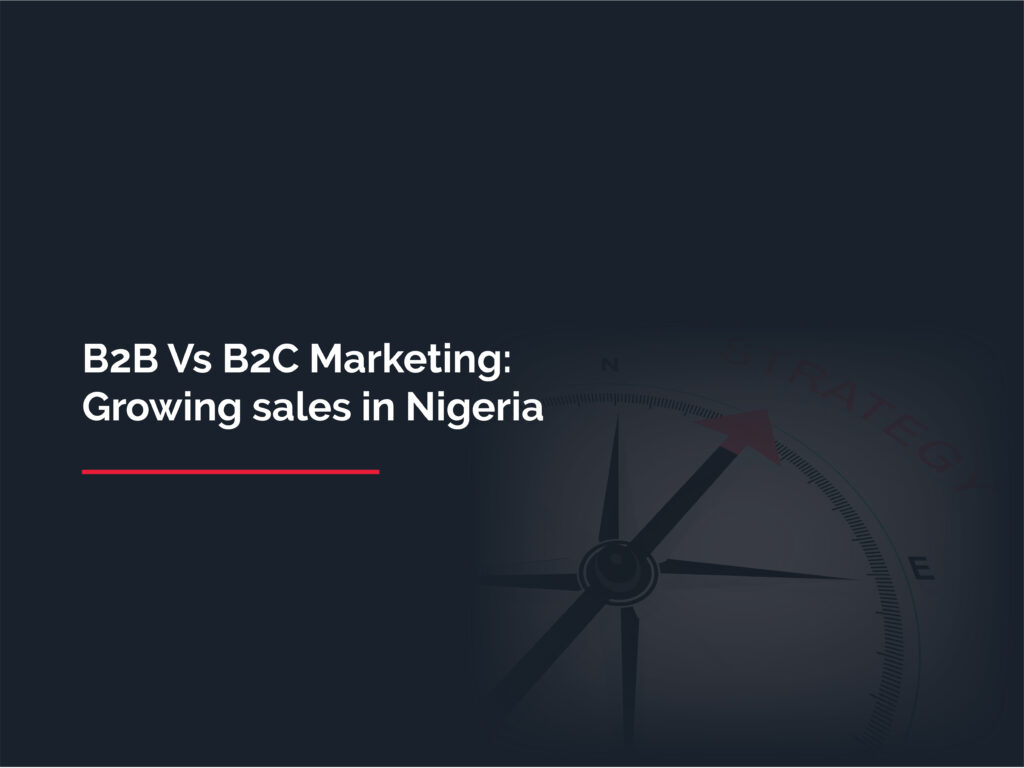
B2B vs. B2C
There are numerous ways to market the goods or services of your multinational corporation in Nigeria. It’s imperative for you as a new player to have a strong sales foundation and steady growth in the Nigerian market. Understanding the two main marketing strategies in this field is crucial since it will enable you to connect with your target audience. In actuality, the choice is between B2B and B2C marketing.
In addition to learning which marketing strategies are employed in Nigeria, it’s crucial that you comprehend how to develop a marketing strategy that will boost your sales by balancing B2B and B2C marketing. A thorough explanation of how these ideas operate in Nigeria, along with the actions you should take is provided below.
Business-to-Business (B2B) Marketing
- Access the Decision-Making Process: The adage “it’s not what you know, it’s who you know” could not be more true when it comes to selling to other companies than in the Nigerian market. The fact that they do not yet have access to the actual decision-makers at their target firms is one of the difficulties that many businesses face when trying to sell to other enterprises. This is particularly relevant to businesses that are new to the Nigerian market because they have a small professional network there.
Finding and hiring the assistance of a specialist in the field who can facilitate introductions to the appropriate people at your target companies is one method to overcome this difficulty. These introductions should include in-person meetings with senior executives who play a key role in the day-to-day operations of their business. - Determine Your Value Proposition and Describe It: You should begin presenting your product to the decision-makers as soon as you get their attention. You must first determine your company’s value with the aim to create the ideal pitch and then persuade the prospective client why they should do business with you. A company’s value in a B2B sales relationship typically consists of opportunities for cost savings or the facilitation of an increase in their client’s revenues.
Once you have established why a sales partnership will be advantageous for your target organization, use that justification as your meeting’s opening statement. However, you should utilize the meeting to learn about the target company’s priorities and concerns. Then, when necessary, you may modify your presentation of your value proposition to solve those issues.
It’s crucial to remember that decision-makers at this level tend to make logical decisions and, as a result, respond best to pitches that make use of strategic thinking and pertinent insights rather than considerate promises encased in cutting-edge ideas. They want to know that by using your services, they will be able to grow their company and improve their bottom line. - Recognize the Process & Close the Deal: You should also pay great attention to the organization’s decision-making process when attempting to win the target company’s business. Your decisions on who to talk to and how to approach the matter will be influenced by this. In many cases, you will be introducing yourself to several stakeholders within your target company, particularly if there are multiple decision-makers present.
If a company wants to buy goods or services from you in Nigeria, the managing director typically has the final say. Therefore, in order to hasten the sale, it is in your best advantage to gain early support from the individual holding that position.
Business-to-Consumer (B2C) Marketing - Access the Decision-Making Process: It is crucial for a multinational corporation operating in Nigeria, a nation of 180 million people, to comprehend its target market and what it takes to persuade them to buy its goods. You can effectively market your products and boost your sales by working with an established advertising agency in Nigeria that comprehends your value and target market.
Additionally, since 80 to 90% of retail transactions in Nigeria take place in impromptu open-air markets, you should partner with a distributor that can ensure that your products are offered in both formal and informal retail markets. - Determine Your Value Proposition and Describe It: In the B2C sector, purchases are frequently motivated more by emotions than by logic. You must therefore be aware of the value your items provide to consumers. You should think about conducting research, like as surveys or in-depth interviews, in an effort to better understand your value and your market. You can use the information you gather about your target market to inform how to position your product as the greatest option for meeting their particular demands.
- Recognize the Process & Close the Deal: How purchasing decisions are made also affects how B2B marketing differs from B2C marketing. In B2C scenarios, one person who meets the profile of your target consumer typically decides to purchase a product. As a result, you do not need to win over a number of diverse stakeholders with disparate economic interests and strategies.
However, it’s crucial to keep in mind that the person who will ultimately utilize your product might not have the purchasing power. Whether you choose a B2B vs. B2C approach or combine the two, knowing who you’re selling to, what they value, and how to contact them is crucial when marketing your company in Nigeria. If you take this advise to heart, your business will have a higher chance of experiencing considerable sales growth while competing in the Nigerian market.
How to Measure the Success of Unique Lead Generation Strategies in Nigerian Markets

To measure the success of unique lead generation strategies in Nigerian markets, businesses need to track specific metrics that are essential to their success. Some of the metrics that businesses should track include:
- Leads generated: Businesses should track the number of leads generated by their unique lead generation strategies. This metric will help businesses understand how effective their strategies are and if they need to make any changes.
- Conversion rate: Businesses should also track their conversion rate to measure the percentage of leads that turn into customers. This metric is essential as it can help businesses identify any potential issues in their sales process and make changes to improve their conversion rate.
- Cost per acquisition: Businesses should also track their cost per acquisition to measure the cost of acquiring a new customer. This metric can help businesses ensure that their unique lead generation strategies are cost-effective and efficient.
Conclusion
Lead generation is a crucial aspect of any business, and if done effectively, can significantly impact your bottom line. By adopting unique B2B and B2C lead generation strategies, Nigerian businesses can stand out in a crowded marketplace and achieve their growth goals. Ensure you measure your success by tracking your performance metrics to assess the effectiveness of your strategies. Lead generation is a long-term process, and it takes time to see results. Stay patient and continue to experiment with new lead generation strategies to find what works best for your business. So, implement these strategies today and watch your business soar.

